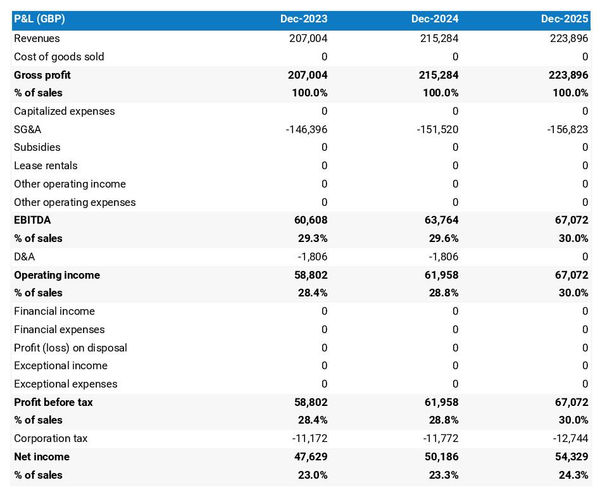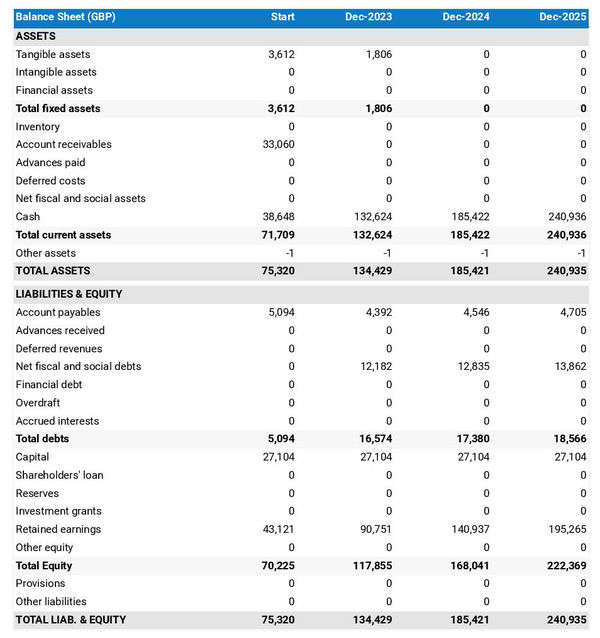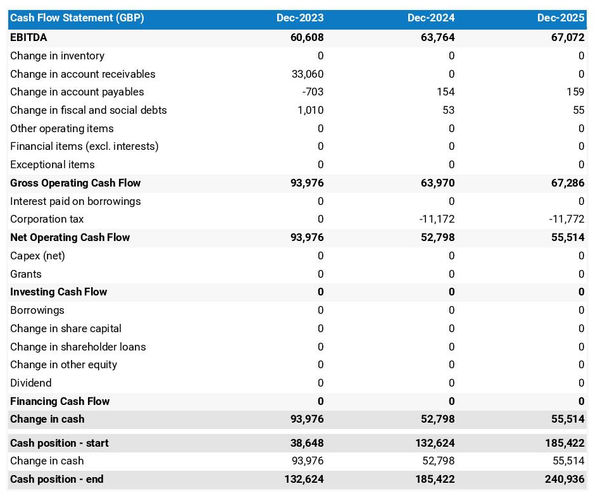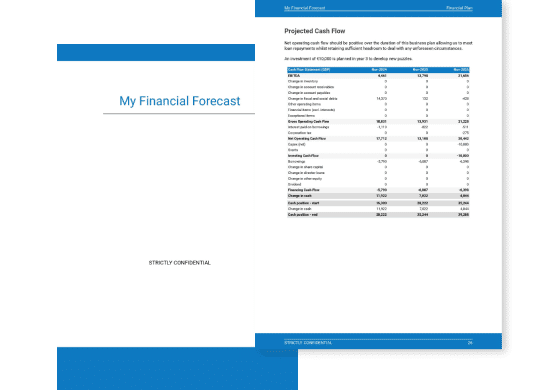How to create a financial forecast for an estate planning law firm?

Creating a financial forecast for your estate planning law firm, and ensuring it stays up to date, is the only way to maintain visibility on future cash flows.
This might sound complex, but with the right guidance and tools, creating an accurate financial forecast for your estate planning law firm is not that hard.
In this guide, we'll cover everything from the main goal of a financial projection, the data you need as input, to the tables that compose it, and the tools that can help you build a forecast efficiently.
Without further ado, let us begin!
Why create and maintain a financial forecast for an estate planning law firm?
The financial projections for your estate planning law firm act as a financial blueprint to guide its growth with confidence and ensure its long-term financial viability.
To create them, you will need to look at your business in detail - from sales to operating costs and investments - to assess how much profit it can generate in the years to come and what will be the associated cash flows.
During challenging market conditions, maintaining an up-to-date financial forecast enables early detection of potential financial shortfalls, allowing for timely adjustments or securing financing before facing a cash crisis.
Your estate planning law firm's financial forecast will also prove invaluable when seeking financing. Banks and investors will undoubtedly request a thorough examination of your financial figures, making precision and presentation essential.
Need a convincing business plan?
The Business Plan Shop makes it easy to create a financial forecast to assess the potential profitability of your projects, and write a business plan that’ll wow investors.

What information is used as input to build an estate planning law firm financial forecast?
A estate planning law firm's financial forecast is only as good as the inputs used to build it.
If you are creating (or updating) the forecast of an existing estate planning law firm, then you mostly need your accounting information, key historical operating non-financial data, and your team’s input on what to expect for the coming years.
If you are building financial projections for an estate planning law firm startup, you will need to have done your research and have a clear picture of your competitive environment and go-to-market strategy so that you can forecast sales accurately.
For a new venture, you will also need a precise list of the resources needed to keep the estate planning law firm running on a day-to-day basis and a list of the equipment and expenditures required to start the business (more on that later).
Let's now take a closer look at the elements that make up your estate planning law firm's financial forecast.
The sales forecast for an estate planning law firm
From experience, it is usually best to start creating your estate planning law firm financial forecast by your sales forecast.
To create an accurate sales forecast for your estate planning law firm, you will have to rely on the data collected in your market research, or if you're running an existing estate planning law firm, the historical data of the business, to estimate two key variables:
- The average price
- The number of monthly transactions
To get there, you will need to consider the following factors:
- Changes in tax laws: As an estate planning law firm, your clients' decisions are heavily influenced by changes in tax laws. Any significant changes in tax laws can impact the average price of your services, as well as the number of monthly transactions. For example, if there is a decrease in estate tax rates, your clients may be less motivated to engage in estate planning, resulting in a decrease in average price and monthly transactions.
- Economic downturn: In times of economic downturn, individuals may be less likely to spend money on estate planning services, resulting in a decrease in your average price and number of monthly transactions. This could be caused by a decrease in disposable income or a general sense of uncertainty regarding the future.
- Demographic changes: Changes in the age distribution of the population in your area can also affect your business. As the population ages, there may be a greater demand for estate planning services, leading to an increase in both your average price and number of monthly transactions.
- Competition: An increase in competition from other estate planning law firms in your area can lead to a decrease in your average price. This is because clients may have more options and may be able to negotiate lower prices. Additionally, an increase in competition may also result in a decrease in the number of monthly transactions if you are unable to retain your current clients.
- Changes in technology: Advancements in technology can also affect your business. For example, if there is a new software or online platform that allows individuals to create their own estate plans, it may decrease the demand for your services, resulting in a decrease in both your average price and number of monthly transactions.
Once you have an idea of what your future sales will look like, it will be time to work on your overhead budget. Let’s see what this entails.
Need a convincing business plan?
The Business Plan Shop makes it easy to create a financial forecast to assess the potential profitability of your projects, and write a business plan that’ll wow investors.

The operating expenses for an estate planning law firm
The next step is to estimate the costs you’ll have to incur to operate your estate planning law firm.
These will vary based on where your business is located, and its overall size (level of sales, personnel, etc.).
But your estate planning law firm's operating expenses should normally include the following items:
- Staff costs: This includes salaries, benefits, and payroll taxes for all employees at your estate planning law firm. You may also have additional expenses such as employee training and development.
- Accountancy fees: As an estate planning law firm, you will need to hire accountants to help with tax planning, financial reporting, and other accounting services. These fees can add up quickly and should be included in your operating expenses forecast.
- Insurance costs: It is important to have insurance coverage for your estate planning law firm to protect against potential legal claims. This can include professional liability insurance, general liability insurance, and property insurance.
- Software licenses: In order to efficiently manage your client data and documents, you will need to invest in software licenses for programs such as document management, time tracking, and billing software. These licenses can come at a significant cost, so be sure to include them in your forecast.
- Banking fees: Your estate planning law firm will have various banking fees, such as monthly maintenance fees, overdraft fees, and wire transfer fees. Be sure to factor these into your operating expenses.
- Rent: If you have a physical office for your estate planning law firm, you will need to include rent or lease expenses in your forecast. This can also include utilities and maintenance costs for the office space.
- Marketing and advertising: To attract new clients, you may need to invest in marketing and advertising efforts such as website development, print materials, and online advertisements. These costs should be included in your operating expenses forecast.
- Office supplies: Your estate planning law firm will have ongoing expenses for office supplies such as paper, ink, toner, and other necessary items. These small costs can add up over time, so be sure to include them in your forecast.
- Professional development: As an estate planning law firm, it is important to stay current with changes in laws and regulations. This may require attending conferences, workshops, and other professional development opportunities, which should be included in your operating expenses forecast.
- Professional memberships: Your firm may also need to pay for memberships to professional organizations and bar associations, which can provide valuable resources and networking opportunities.
- Office equipment: In addition to software licenses, your estate planning law firm may also need to purchase or lease equipment such as computers, printers, and scanners. These costs should be included in your forecast.
- Travel expenses: If you need to travel for client meetings, conferences, or other business purposes, be sure to include travel expenses, such as airfare, hotel stays, and meals, in your operating expenses forecast.
- Telephone and internet: Your firm will need to have reliable telephone and internet services to communicate with clients and conduct research. Be sure to include these expenses in your forecast.
- Legal fees: As a law firm, you may need to seek legal advice or representation for your own business. These fees should be included in your operating expenses forecast.
- Office maintenance: Your office space will require regular maintenance and repairs, such as cleaning services, pest control, and equipment repairs. These costs should be factored into your operating expenses forecast.
This list is not exhaustive by any means, and will need to be tailored to your estate planning law firm's specific circumstances.
What investments are needed to start or grow an estate planning law firm?
Once you have an idea of how much sales you could achieve and what it will cost to run your estate planning law firm, it is time to look into the equipment required to launch or expand the activity.
For an estate planning law firm, capital expenditures and initial working capital items could include:
- Office Space: As an estate planning law firm, you will need a professional and inviting office space to meet with clients and conduct business. This may include leasing or purchasing a commercial space, as well as any necessary renovations or upgrades.
- Technology and Equipment: In order to effectively run your law firm, you will need to invest in technology and equipment such as computers, printers, software, and communication systems. These items are essential for managing client information, creating legal documents, and staying connected with clients and colleagues.
- Furniture and Furnishings: Your office space will also require furniture and furnishings, such as desks, chairs, filing cabinets, and decor. These items not only provide a comfortable and professional environment for you and your staff, but also make a good impression on clients.
- Legal Library: As an estate planning law firm, you will need access to a comprehensive legal library to research and reference laws, cases, and other important information. This may include purchasing subscriptions to online legal databases or physical books and materials.
- Professional Fees: It is important to factor in any professional fees that may be necessary for your law firm, such as legal or financial consulting services. These fees can vary depending on your specific needs and the complexity of your clients' cases.
Again, this list will need to be adjusted according to the specificities of your estate planning law firm.
Need a convincing business plan?
The Business Plan Shop makes it easy to create a financial forecast to assess the potential profitability of your projects, and write a business plan that’ll wow investors.

The financing plan of your estate planning law firm
The next step in the creation of your financial forecast for your estate planning law firm is to think about how you might finance your business.
You will have to assess how much capital will come from shareholders (equity) and how much can be secured through banks.
Bank loans will have to be modelled so that you can separate the interest expenses from the repayments of principal, and include all this data in your forecast.
Issuing share capital and obtaining a bank loan are two of the most common ways that entrepreneurs finance their businesses.
What tables compose the financial plan for an estate planning law firm?
Now let's have a look at the main output tables of your estate planning law firm's financial forecast.
The profit & loss forecast
The forecasted profit & loss statement will enable you to visualise your estate planning law firm's expected growth and profitability over the next three to five years.

A financially viable P&L statement for an estate planning law firm should normally show:
- Sales growing above inflation
- Stable or expanding (ideally) profit margins
- A net profit
This will of course depend on the stage of your business: a new venture might be loss-making until it reaches its breakeven point in year 2 or 3, for example.
The projected balance sheet
The projected balance sheet gives an overview of your estate planning law firm's financial structure at the end of the financial year.
It is composed of three categories of items: assets, liabilities and equity:
- Assets: are what the business possesses and uses to produce cash flows. It includes resources such as cash, buildings, equipment, and accounts receivable (money owed by clients).
- Liabilities: are the debts of your estate planning law firm. They include accounts payable (money owed to suppliers), taxes due and bank loans.
- Equity: is the combination of what has been invested by the business owners and the cumulative profits to date (which are called retained earnings). Equity is a proxy for the value of the owner's stake in the business.

The cash flow projection
The cash flow forecast of your estate planning law firm will show how much cash the business is expected to generate or consume over the next three to five years.

There are multiple ways of presenting a cash flow forecast but from experience, it is better to organise it by nature in order to clearly show these elements:
- Operating cash flow: how much cash is generated by the estate planning law firm's operations
- Investing cash flow: what is the business investing to expand or maintain its equipment
- Financing cash flow: is the business raising additional funds or repaying financiers (debt repayment, dividends)
Your cash flow forecast is the most important element of your overall financial projection and that’s where you should focus your attention to ensure that your estate planning law firm is adequately funded.
Note: if you are preparing a financial forecast in order to try to secure funding, you will need to include both a yearly and monthly cash flow forecast in your estate planning law firm's financial plan.
Need a convincing business plan?
The Business Plan Shop makes it easy to create a financial forecast to assess the potential profitability of your projects, and write a business plan that’ll wow investors.

Which tool should you use to create your estate planning law firm's financial forecast?
Using the right tool or solution will make the creation of your estate planning law firm's financial forecast much easier than it sounds. Let’s explore the main options.
Using online financial forecasting software to build your estate planning law firm's projections
The modern and easiest way is to use professional online financial forecasting software such as the one we offer at The Business Plan Shop.
There are several advantages to using specialised software:
- You can easily create your financial forecast by letting the software take care of the financial calculations for you without errors
- You have access to complete financial forecast templates
- You get a complete financial forecast ready to be sent to your bank or investors
- You can easily track your actual financial performance against your financial forecast, and recalibrate your forecast as the year goes by
- You can create scenarios to stress test your forecast's main assumptions
- You can easily update your forecast as time goes by to maintain visibility on future cash flows
- You have a friendly support team on standby to assist you when you are stuck
- It’s cost-efficient and much cheaper than using an accountant or consultant (see below)
If you are interested in this type of solution, you can try our forecasting software for free by signing up here.
Hiring a financial consultant or chartered accountant
Hiring a consultant or chartered accountant is also an efficient way to get a professional estate planning law firm financial projection.
As you can imagine, this solution is much more expensive than using software. From experience, the creation of a simple financial forecast over three years (including a balance sheet, income statement, and cash flow statement) is likely to start around £700 or $1,000 excluding taxes.
The indicative estimate above, is for a small business, and a forecast done as a one-off. Using a financial consultant or accountant to track your actuals vs. forecast and to keep your financial forecast up to date on a monthly or quarterly basis will naturally cost a lot more.
If you choose this solution, make sure your service provider has first-hand experience in your industry, so that they may challenge your assumptions and offer insights (as opposed to just taking your figures at face value to create the forecast’s financial statements).
Why not use a spreadsheet such as Excel or Google Sheets to build your estate planning law firm's financial forecast?
Creating an accurate and error-free estate planning law firm financial forecast with a spreadsheet is very technical and requires a deep knowledge of accounting and an understanding of financial modelling.
Very few business owners are financially savvy enough to be able to build a forecast themselves on Excel without making mistakes.
Lenders and investors know this, which is why forecasts created on Excel by the business owner are often frowned upon.
Having numbers one can trust is key when it comes to financial forecasting and to that end using software is much safer.
Using financial forecasting software is also faster than using a spreadsheet, and, with the rise of artificial intelligence, software is also becoming smarter at helping us analyse the numbers to make smarter decisions.
Finally, like everything with spreadsheets, tracking actuals vs. forecasts and keeping your projections up to date as the year progresses is manual, tedious, and error-prone. Whereas financial projection software like The Business Plan Shop is built for this.
Need a convincing business plan?
The Business Plan Shop makes it easy to create a financial forecast to assess the potential profitability of your projects, and write a business plan that’ll wow investors.

Use our financial projection templates for inspiration
The Business Plan Shop has dozens of financial forecasting templates available.
Our examples contain both the financial forecast, and a written business plan which presents, in detail, the company, the team, the strategy, and the medium-term objectives.
Whether you are just starting out or already have your own estate planning law firm, looking at our template is always a good way to get ideas on how to model financial items and what to write when creating a business plan to secure funding.

Takeaways
- A financial forecast shows expected growth, profitability, and cash generation metrics for your estate planning law firm.
- Tracking actuals vs. forecast and having an up-to-date financial forecast is key to maintaining visibility on your future cash flows.
- Using financial forecasting software is the modern way of creating and maintaining financial projections.
We hope that this guide helped you gain a clearer perspective on the steps needed to create the financial forecast for an estate planning law firm. Don't hesitate to contact us if you have any questions!
Need a convincing business plan?
The Business Plan Shop makes it easy to create a financial forecast to assess the potential profitability of your projects, and write a business plan that’ll wow investors.

Also on The Business Plan Shop
- Financial forecast example
- How to project sales for a business?
- Financial forecast for a business idea
Know someone who runs an estate planning law firm? Share our business guide with them!



